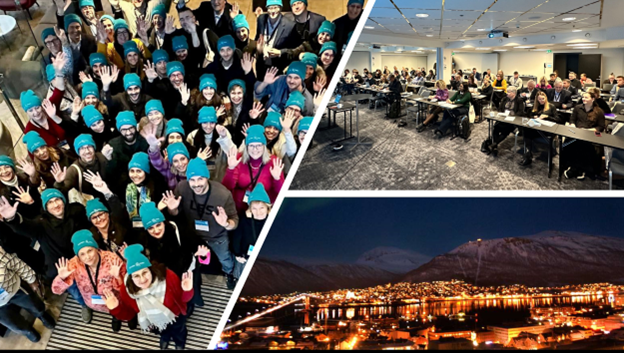The Gravitate-Health public-private partnership held a two-day in-person interactive workshop on October 29-30, 2024, above the arctic cycle, in Tromsø, Norway. The workshop showcased the third Minimal Viable Product for the G-lens app and explored feedback from real-life test cases. Gravitate-Health is strongly engaged in the Vulcan accelerator Electronic Product Information (EPI) project.
Launched in 2020, the Gravitate-Health consortium, now in its fourth year as a public-private IHI (Innovative Health Initiative)-funded project, is well positioned to achieve its core mission to equip and empower citizens with digital information tools that make them confident, active, and responsive in their patient journey, specifically encouraging safe use of medicines for better health outcomes and quality of life.


Since project commencement, several key milestones have been achieved, including development of the G-lens®, federated technical platform services (FOSPS) architecture and real-world validation of use cases (Fig. 1). These accomplishments follow four action lines, including testing scenarios and evaluation; technology development to support the HL7 FHIR –based ePIs; dissemination, communication and sustainability and innovation; and finally project management and governance (Fig. 2). The contribution of Gravitate-Health starts from a “post-prescription” situation, seeking to improve access and offer understandable information about ongoing treatment.
Gravitate-Health delivered three key innovations acknowledged by EU Innovation Radar: the ePI Implementation Guide, the open-source technology platform (FOSPS), and the Gravitate-Health collaborative community. Also important to note, the IHI project assessment has evaluated and recognized the project as “fully achieving its objectives and milestones.”

What’s Next
Looking forward, the consortium will build on these achievements and focus on dissemination and broad engagement with audiences and constituencies via activities like user communities, holding a Gravitate-Health Hackathon, and participating in the HIMSS Interoperability Showcase. The consortium will also focus on maximizing impact by extending its work to mid-2026, including onboarding four new partners from the 4 +1 Compendia project and completing scenario groupings “test at scale” and ”advanced test” to gain user insights.
At the same time, the next four HL7 FHIR® Connectathons aim to test developments in version 3 of G-lens®, joining forces with the Global IDMP Working Group (GIDWG) and building on the work of the UNICOM project in relation to product identification. Other elements relate to validating theFOSPS architecture and third-round testing of new lenses, as well as the development and alignment of the Vulcan HL7 FHIR® ePI Implementation Guide with regulators and an authoring guide on ePIs focusing on their digital presentation with diversity and inclusion in mind.
Exploring sustainability and longer-term impact considerations led to the relaunch of the Sustainability Task Force to review asset mappings and future models for sustainability and exploitation, including engaging with the Personalization Expert Group to look at safety and risk anticipations. Finally, the Gravitate-Health team will work to expand stakeholder outreach to the broader community and to increase communication with policy/government stakeholders around the world.

Gravitate-Health has engaged with HL7 FHIR Vulcan Accelerator, the Global IDPM Working Group (GIDWG), and more than 19 regulators worldwide to develop and promote an HL7 FHIR ePI standard that makes ePI more accessible, improves patient experience, and supports international interoperability (see Fig 3).

“During the Gravitate-Health Interactive workshop in Tromsø, we welcomed the Nordic Medicinal Product Information Compendia as new partners. Leveraging the Gravitate-Health community that we have built over the last four years we shared our collective achievements on FOSPS architecture platform, G-lens® mechanisms and validation plans. We also discussed next steps, value propositions and alternatives for sustaining our effort and exploiting results for the benefit of patients in Europe and globally”.
—Professor Anne Moen

Upcoming Meetings
The Gravitate-Health team is planning to organize a track in the virtual January 2025 Connectathon and then meet in person at the next one in May 2025 in Madrid, Spain. Gravitate-Health partners are also involved in the upcoming Vulcan interoperability Bridge. Join us!
About Gravitate-Health
The Gravitate Health is a public–private partnership with 45 members from Europe and the US, co-led by the University of Oslo (coordinator) and Pfizer (industry lead), funded by the Innovative Medicines Initiative (IMI) – a joint undertaking of the European Commission, the European Federation of Pharmaceutical Industries and Associations (EFPIA), IMI2 Associated Partners. Gravitate-Health collaborates with the Vulcan accelerator in the ePI project.

